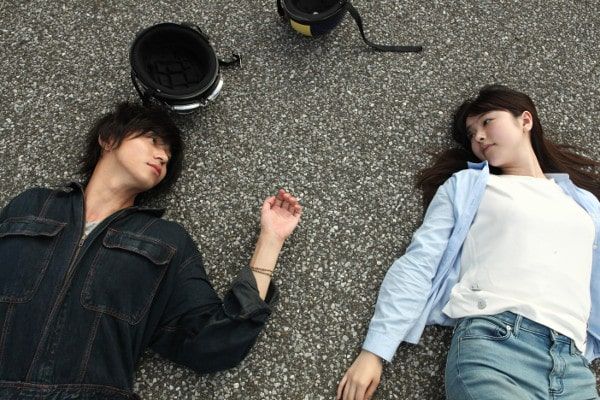Eye For Film >> Movies >> Asako I & II (2018) Film Review
Asako I & II
Reviewed by: Jennie Kermode

One of the most intriguing cinematic trends of recent years has been the Japanese adoption and reinvention of European literary tropes of the 18th and 19th Centuries. There's a particular interest in the Gothic, shorn of its ornamental trappings and reinvisaged in starkly horrific forms. Ryûsuke Hamaguchi's bleak romantic drama, adapted from the work of Tomoka Shibasaki, centres on the concept of dualism, its young heroine serially falling for two men who may as well be doppelgängers. As the title suggests, though, what the story really hinges on is not their duality but hers.
There are doubles throughout this meandering tale: other couples formed at the same time, discourses on Chekov (whose work frequently focused on internal dualism), parallels between actors and roles, a visit to an exhibition of works by Shigeo Gocho where the heroine fixates on a photograph from his Self And Others collection. The shape of her mouth and the way she styles her hair make her look not unlike the twins in the latter, as if they had grow up and fused into one. Asako (Erika Karata) is - physically at least - one woman, but over the course of the film she will live two lives, experience what may be two loves or just one.

It begins in Osaka, where the shy young woman falls in love with the outrageous, funny and unpredictable Baku. His confidence and charisma dazzle her but a darker aspect to their relationship emerges when she learns that there are things he's not telling her. His subsequent disappearance, then, is not entirely surprising, but this doesn't make it any easier to bear. Unable to handle waiting in the same place indefinitely, she moves to Tokyo, where she is startled to meet somebody who looks exactly like him. Quiet, self-effacing office worker Ryôhei (also played by Masahiro Higashide, whose unusual height makes the resemblance more striking than mere facial similarity) is fascinated by her strange reaction to him, and as she gradually accepts that this is not Baku playing some awful practical joke, the two are drawn together. An apparently more mature, sincere romance begins, troubled by a pair of lingering questions. Does Asako really love Ryôhei or are her feelings just a manifestation of her continuing love for Baku? And what will happen in Baku returns?
A road trip by night recalls David Lynch's Lost Highway and there are hints that at least part of the film is a dream; no matter how we interpret it, the problems it presents and the things it reveals about Asako's character are the same. Does Ryôhei love her, or only a part of her? How does the sweet young woman we spend most of the film with connect to the amoral, passionate creature we glimpse when she slips into different patterns of behaviour, and how does this relate more generally to expectations of women in Japanese society, to the relationship between dutiful wife and more complex, wilful human being?
Both leads are excellent. Higashide will no doubt attract most attention, impressive in his ability to inhabit two very different characters, yet it's Karata who is the power at the heart of the film, using deferential body language to hint at the exhausting internal repression of something every bit as formidable as either of the men. As Baku comes to seem more like a fantasy, there's a suggestion that he represents the life she wants as opposed to the life she has settled for, that the idea of him is at least as dangerous as the reality. Meanwhile, Hamaguchi presents her alongside Ryôhei in small domestic spaces, the two of them preparing food or entertaining guests, shopping together or playing with their strikingly beautiful cat, Jintan. Asako clearly enjoys this life but can she hang onto it, alert as she is to possibility? In a pair of scenes she stands beside the sea listening to talk of love, her eyes drifting the horizon.
If you feel this is a subject you've seen onscreen before, don't let that put you off. After all, you're not the same person now.
Reviewed on: 04 Nov 2019














